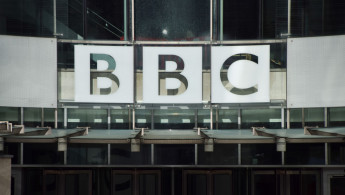Huna London: BBC Arabic radio leaves the airwaves after 85 years
The studio lights have gone off at BBC Arabic radio for the last time after 85 years of broadcasting from the station which broke stories of the Suez Crisis, the Palestinian Nakba and the Arab spring uprisings of 2011.
On Friday at 13:00 GMT, presenters Nour Eddine Zorgui and Mahmoud al-Mosallem uttered the iconic words “Huna London” for the last time.
“We thank you for your loyalty, your love and loyalty to our service. You are the cornerstone of this proud journey. This is not goodbye,” said al-Mosallem in his final broadcast.
“We will finish where we started, with that famous slogan - here we are in London, at the BBC”.
Baba’s final statement for the last moments of BBC Arabic radio on air - so proud 🥹❤️ pic.twitter.com/DtMslNAeJm
— Osha Mahmoud (@Osha001) January 27, 2023
BBC Arabic, funded until 2013 by the UK foreign office, has been a mainstay of Arabic broadcast media and a part of Britain’s soft power in the MENA region for decades.
The first BBC Arabic radio report featured news of the execution of a 28-year-old Palestinian man by British authorities for resisting the colonial occupation.
خبر تنفيد الإعدام في الشهيد إبراهيم حسين ناصر من قرية علار قضاء طولكرم | جريدة الدفاع - فلسطين المحتلة ٤ يناير ١٩٣٨
— The Palestinian Archive الأرشيف الفلسطيني (@palestinian_the) January 27, 2023
وكان خبر إعدام الشهيد من قبل الاحتلال البريطاني، خلال الثورة الفلسطينية الكبرى، هو أول خبر تذيعه إذاعة بي بي سي العربية عند انطلاقها في ٣ يناير ١٩٣٨ pic.twitter.com/j61mfKBhbM
The BBC says that a switchover from radio to digital media will reach a wider range of audiences and change how the broadcasting heavyweight gathers news around the world.
“There is a compelling case for expanding our digital services across the World Service in order to better serve and connect with our audiences,” said world service chief Liliane Landor when the news was announced.
But with over 10 language radio stations brought to a close and nearly 400 job losses, BBC World Service colleagues have been sharing their emotions on social media on this significant day.
It's far beyond sad and painful to see @BBCArabic radio shutting down today, after nearly 85 years on air! It's incredibly difficult to describe how we feel!
— Sally Nabil (@sallynabil) January 27, 2023
“The way audiences are accessing news and content is changing and the challenge of reaching and engaging people around the world with quality, trusted journalism is growing,” said Liliane Landor.





 Follow the Middle East's top stories in English at The New Arab on Google News
Follow the Middle East's top stories in English at The New Arab on Google News


